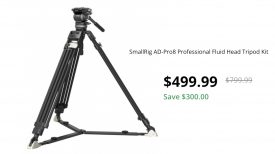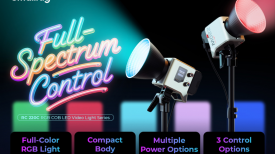
Despite so many uncoated or single coated lenses now flooding the market, the easiest way to achieve different looks is through the use of filters, especially diffusion filters.

Some of the newest filters on the market are from Tokina Cinema. You may not associate filters with Tokina, but Kenko Tokina is the world’s largest photography optical accessory manufacturer. They have been manufacturing and selling camera filters since 1974.
I’m a big proponent of using diffusion filters. They allow me to create a look and change the appearance or characteristics of whatever lens I may happen to be using. I have been using Tiffen Glimmer Glass for many years now, but as an owner of several Tokina Cinema Vista Primes, I wanted to see how the companies new diffusion filters performed.
Why use diffusion filters?

Diffusion filters give you creative control of your image in-camera. They let you choose to reduce high-frequency resolution, raise black levels, bloom highlights, or tailor a combination that is unique to your scene.
All diffusion filters affect three areas of your image:
- Contrast
- Halation
- Resolution
You just need to need to carefully consider how you use diffusion filters. Often it is a bit of trial and error to come up with what works best for the look you are after.
As I said earlier, I like using diffusion filters, because I don’t have to get locked into a look. If I go with a specific lens that has unique characteristics I am stuck with a look that I can’t really change. As an owner/operator in a lot of ways, it makes more sense to go with a lens that has quite a clean look, because that way you can use diffusion filters to change that look.
If you are on big productions where the gear is going to be hired in, you are going to use whatever lens best fits that project. For owner/operators, you don’t always have that luxury. You need to be more creative, and that’s where filters can make a real difference.
Yes, you can do an awful lot in post these days, but I’m a little old school, and I like to do as much in-camera as possible.
In saying that, there is certainly an argument that you could make for shooting everything as clean as possible and then creating diffusion effects in post.
How did Tokina come up with their Diffusion Filters?

Tokina Cinema analyzed data from thousands of feature films, commercials, TV shows, and independent productions to find the most relevant optical diffusion combinations being used today. This data was then distilled into four basic filter types that replicate the vast majority of in-camera diffusion today.
This is a good strategy. Don’t tell someone what they need, ask them what they want.
What Diffusion Filters are available?

Tokina Cinema makes Black Supermist, Clear Supermist, Black Alchemy, SoftRes, and Pearlescent. All the filters are available in various strengths. Currently, they are only available in the 4 x 5.65 size.

Above you can see a nicely laid out table that tells you exactly what the filters do. This makes it very easy to see how the different filters, and strengths of those filters, effects resolution, halation, and contrast.
For example, the weakest strength filter is the SoftRes 1/8 strength, while the highest strength filter is the Pearlescent 1 strength.
If you start combining 2 or more filters you drastically change the look of your images.
Clear Supermist
Clear Supermist is a diffusion filter that primarily affects halation. You can control how much bloom or halation your image receives based on lighting angle and strength of light sources in your scene.
Clear Supermist is made of fine clear colorless particulate that is bonded between two pieces of Schott B270 Optical Glass which exceeds 4K resolution capability. The clear particulate ranges in size from slightly smaller than a pixel to slightly larger than a pixel size to alter incoming light that creates the pleasing reduction in resolution with a primary effect on halation and some contrast.
Available in strengths of 1/8, 1/4, 1/2, and 1. The 1 strength is the most popular for a stronger halation effect. Halation filters are generally preferred in stronger densities to make the effect noticeable.
Black Supermist

Black Supermist is a diffusion filter designed to affect resolution in a pleasing manner by reducing high-frequency details like wrinkles and blemishes in skin while raising black levels slightly to create a film-like look.
Black Supermist is made of fine black color particulate that is bonded between two pieces of Schott B270 Optical Glass which exceeds 4K resolution capability. The black particulate ranges in size from slightly smaller than a pixel to slightly larger than a pixel size to alter incoming light that creates the pleasing reduction in resolution and a slight raise in contrast. This is attributable to a “film-like” look that takes the edge off modern high-resolution images and optics.
Available in strengths of 1/8, 1/4, 1/2, and 1. The lightest and most popular strength is 1/8 for a slight diffusion effect that isn’t overly noticeable by the viewer.
Black Alchemy

Black Alchemy is a diffusion filter designed to affect resolution and contrast with a slight boost of halation to light sources. This is a combination of the Black Supermist 1/8 with a variable strength of SoftRes filter depending on the strength selected. Black Alchemy diffuses in a pleasing manner by reducing high-frequency details like wrinkles and blemishes in skin while raising black levels slightly and adding halation bloom to light sources.
Black Alchemy is made of fine black and white color particulate that is bonded between two pieces of Schott B270 Optical Glass which exceeds 4K resolution capability. The particulate ranges in size from slightly smaller than a pixel to slightly larger than a pixel size to alter incoming light that creates the pleasing reduction in resolution and a slight raise in contrast with bloom to highlights..
Available in strengths of 1/16, 1/8, 1/4, 1/2, and 1. This is a strong diffusion effect and therefore 1/8 and 1/4 strengths are most popular. Strengths 1/2 and 1 are reserved for a strong dramatic effect or dream sequence type scene.
SoftRes

SoftRes is a diffusion filter designed to affect resolution in a pleasing manner by reducing high-frequency details like wrinkles and blemishes in skin while leaving other areas of the image unaffected.
SoftRes is made of fine white color particulate that is bonded between two pieces of Schott B270 Optical Glass which exceeds 4K resolution capability. The particulate ranges in size from slightly smaller than a pixel to slightly larger than a pixel size to alter incoming light that creates the pleasing reduction in resolution with a slight effect on contrast.
Available in strengths of 1/16, 1/8, 1/4, 1/2, and 1. Most users seek a slight almost unnoticeable reduction in resolution therefore the 1/8 strength is the most popular.
Pearlescent

Pearlescent filters soften contrast and reduce sharpness. This can be useful when shooting with high-resolution digital cinema cameras in order to create a more flattering image of your subject by reducing the appearance of blemishes and softening highlights.
Available in strengths of 1/8, 1/4, 1/2, and 1.
Real World Performance
I did some tests with the filters to see what type of effect they produce. Above you can see what all of the filters look like at their various strengths. I have purposely put lights in the scene that will help show the differences between all of the filters.
As you can see, you can create very subtle changes or quite extreme changes depending on the strength of the filters you use.
Above you can see an additional test with all the filters at their various strengths. I have just used a little toy robot and placed a light source in the frame so you can see how halation and contrast are affected. I have purposely shot wide open on a T1.5 lens so you can see what happens to both the foreground and background when you apply the various filters.
Above there is an additional SoftRes test that I did in 4K.
Price & Availability
The filters are all available to purchase. Below is what the filters retail for:
- Pearlescent $359 USD
- SoftRes $359 USD
- Black Alchemy $419 USD
- Clear Supermist $359 USD
- Black Supermist $359 USD
Competition
There are lots of diffusion filters out there on the market from companies such as Tiffen, Schneider, Formatt Hitech, Pancro Mitchell, and NiSi.
The prices and types of diffusion filters that are available are wide and varied.
Conclusion

Diffusion filters are a very cost-effective way of creating different looks in conjunction with lenses you already own or rent.
Having a good set of diffusion filters is a long term investment. You don’t need to go and buy 4 or 5 variations of every type of diffusion filter that are available. Sometimes just having a couple of filters that compliment the look you like is the key.

Choosing what strength to get is always tricky if you are just after one filter. If you choose a mild strength it may not make enough of a difference, if you choose a high strength it might be too much. In saying that, just settling on a mid-strength filter may not be the best choice either. If I am starting to confuse you, believe me, I’m not trying to do it on purpose. Choosing a diffusion filter is very much a personal choice. What works for one person, won’t work for another.
Do you use diffusion filters? What are some of your favorite options? Let us know in the comments section below.
Like what we do and want to support Newsshooter? Consider becoming a Patreon supporter and help us to continue being the best source of news and reviews for professional tools for the independent filmmaker.









